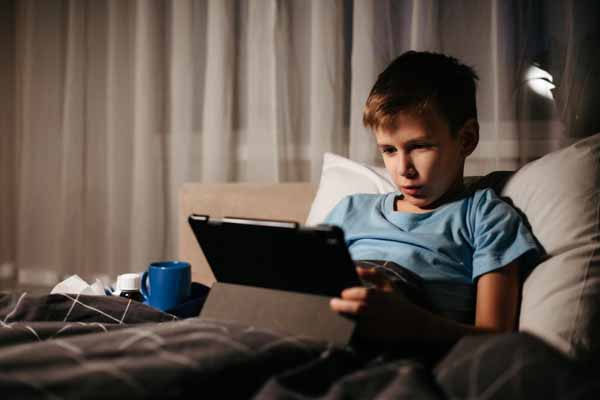Watching T.V. constitutes an inseparable part of our lives. While we adults mightn’t have had so much exposure to television when we were young, the world as we know it today is completely different, what with the vast plethora of really good content out there. The trick, of course, is to ensure we maintain a fine balance – the last thing we want is to be raising future couch potatoes!
Why Parents Should Monitor Screen Time
While many parents see the advantages of watching TV for a child, such as educational enrichment and entertainment, unmonitored screen time comes with side effects of television that can’t be ignored. The bad effects of watching television are particularly evident when children replace outdoor play, reading, or social interaction with long hours in front of a screen. By monitoring viewing schedules and co-watching, parents can encourage healthier habits and avoid the negative effects of television on children.
Here are the Good Effects of Watching T.V. With your Toddler
In all probability, you’re looking for the good news first. All right then! Let’s take a look at exactly how T.V. plays a positive role in the lives of our toddlers.
1. Educational Content
Sesame Street is but one example of a television channel that strives to impart education to preschoolers. Besides this wonderful channel, children watching T.V. can choose from several others that will improve their Math, Art and Craft, and even History skills, to name a few examples.
Tip: You might wish to expose your kids to channels that introduce them to languages around the world.
2. It Boosts Independent Thinking
Television has the effect of enabling children to think ‘outside the box’. Not the television box, of course, but the box of limited thinking we all fall trapped in. This skill they will find to be vital to them in a world that encourages creativity. Clearly one of the better benefits of watching T.V.!
3. Keeps them Engaged
Entertainment has that knack for keeping human beings, from toddlers to adults, highly engaged. Children watching T.V. will be enthralled by the wide gamut of colours and sounds on television.
4. Stress Relief
Your preschooler, when watching T.V., will be relieved from that emotional stress that you might not even know they are going through on a daily basis. As long as that daily dose of T.V. is healthy, of course!
5. Exposure to Different Cultures
Children watching T.V. are exposed to different cultures around the world. For instance, when they watch channels like Discovery Channel, they might be introduced to tribes that have a whole different way of living from us.
6. Better Academic Performance
Which parent doesn’t want their child to perform well academically? One of the stellar benefits of children watching T.V. is that they perform well in things like multiple standardized tests. They even do better in middle and high school.
7. Helps Get them Inspired
Children watching T.V. might just get inspired to do things they see on screen and perhaps want to become a doctor or a scientist. A show about artists might just have them reaching for those crayons!
8. Becoming Tech-Savvy
Your preschooler, watching T.V., might imbibe those technological skills faster than you can imagine. Skills that will hold them in good stead in a fast-changing technological world. What’s more, they also keep up to date with the latest social trends.
9. Improves Language and Communication Skills
One of the good effects of television on children is that it helps them learn new words and ways of talking. When toddlers watch shows with songs, rhymes, or simple kids stories on friendship and other themes, kids slowly pick up vocabulary and sentence patterns. This improves their ability to speak and express feelings clearly. Parents can make this even better by talking to their child about the show, which turns screen time into a fun learning activity.
Here are the 8 The Bad Effects of Watching T.V. With your Toddler
Now, time for that bad news. Every silver lining has a cloud lurking behind, after all! Here’s a look at why we shouldn’t allow our little ones to watch too much TV.
1. Lack of Physical Activity
There’s good reason for this to be on the top of the ‘No T.V. Reasons’ list. One of the biggest disadvantages of watching T.V. for your child is sometimes they refuse to do anything but watch T.V. the entire day. The resultant lack of physical activity is linked to obesity.
Also Read – Creative Ways to Encourage Physical Activities for Kids
2. Takes Away Valuable Time
Children watching T.V. are lured away into a cave of isolation, almost like the Pied Piper of Hamlin leading all those children to their dark fates. The time they spend watching T.V. could be better spent mingling with other kids and doing important things like homework.
3. It Could Affect Brain Development
One of the more serious disadvantages of watching T.V. for your child it could affect childrens brain development. Further, research done by Johns Hopkins University has shown that toddlers who watch more than two hours of television a day can also have behavioral problems.
4. Lack of Focus
Children watching T.V. for more than 2-3 hours a day might find themselves suffering from a lack of that vital focus needed in their developing years. As a result, they stand a greater chance of being diagnosed with ADHD (Attention-Deficit HyperActivity Disorder).
Also Read – Concentration Problems in Children Major Causes
5. Exposure to Vice
The last thing you want is for your child to be exposed to vice at that precious age. Your preschooler, when watching T.V., might inadvertently stumble upon things like sex, alcohol, and drugs. This might, in turn, bring up questions that are increasingly hard to answer and for them to comprehend.
6. Negative Behavior
There is research that shows that children watching T.V. for too long stand the risk of their brain structure being altered and being prone to exhibiting negative behavior, like an outpouring of aggression. Children watching content inappropriate for minors stand at higher risk of this problem.
Also Read – Effective Ways to Control Inappropriate Children’s Behavior
7. Impact on Social Development
Children who watch too much T.V. are prone to their social skills being hampered. After all, they do not play with other children, instead finding themselves cooped up in front of the T.V. for way too long. This lack of interaction with their peers can be costly in future.
Also Read – Importance Of Developing Social Skills in Kids
8. A Distorted Worldview
Kids watching T.V. might garner an unrealistic view of the world around them. For instance, they might think the world is far more violent than it really is, with all the shootings they see on television. Cartoons, on the other hand, might desensitize them to real-world events.
Also Read: Effective Strategies to Counteract Child TV Addiction
How TV Affects Your Child’s Emotional Development
One of the less discussed but equally important areas is how television shapes emotional responses. Young children often mirror what they see on screen. If the content is full of aggression or unhealthy relationships, it may normalise such behaviours. On the other hand, shows that highlight kindness, empathy, and problem-solving can positively reinforce good values. Parents should be mindful of how TV affects your child emotionally, as this is often a long-term effect.
Creating a Balance Between Screen Time and Play

The key is not to eliminate television but to create balance. A structured daily routine ensures children enjoy both learning through television and active play. Setting aside specific hours for viewing, while also encouraging outdoor activities, reading, or imaginative play, reduces the bad effects of watching television while keeping the advantages of watching TV for a child intact.
Choosing Content Wisely
Parents play a critical role in curating what their children watch. Opting for educational, age-appropriate shows that promote creativity and values helps avoid the disadvantages of watching TV for a child. Involving children in discussions about what they watch makes television a shared experience, rather than a passive one.
Encouraging Family Viewing
Television doesn’t have to be an isolating experience. Watching shows together allows parents to explain concepts, answer questions, and share laughter with their children. Family viewing transforms screen time into bonding time while helping children process what they watch in a healthy way.
Screen-Free Alternatives
Finally, while it’s impossible to keep children away from screens completely, offering them screen-free alternatives helps reduce dependency. Arts, crafts, puzzles, and outdoor play can all serve as engaging substitutes. By mixing these activities with limited screen time, children learn that entertainment exists beyond television.
Balancing Real Play with Screen Time
Childhood is best nurtured through curiosity, play, and imagination. Spending too much time watching television can limit hands-on exploration, which is vital for developing problem-solving skills and creativity. When children are encouraged to divide their day between outdoor activities, creative play, and limited TV, they benefit from both worlds. This balance helps reduce the bad effects of watching TV and enhances their learning experience without dependency on screens.
Also Read: Is Watching TV During Meals Harmful for Kids?
The Influence of Advertisements on Toddlers
Another lesser-discussed aspect of TV is advertising. Children are highly impressionable, and constant exposure to commercials can affect their food preferences, material desires, and even social behaviour. This is one of the overlooked disadvantages of watching TV for a child, as children often find it difficult to distinguish between entertainment and marketing. Parents should step in to explain the difference, ensuring that toddlers are not misled by unrealistic portrayals on television.
Conclusion
It’s hard for toddlers to avoid watching T.V., especially when that television is usually on by default, without anyone even watching it. In this article, you have gleaned the pros and cons of watching television, so you can make an informed decision about both the quality of television your Toddler should be exposed to, as well as the amount of screen time you need to allow them. Visit EuroKids Blogs for more such engaging content.
Related Blogs
Impact of TV on Children’s Vision
Prolonged screen exposure can take a toll on young eyes, leading to issues like eye strain and difficulty focusing. In this blog, we explore how television affects children’s vision, the signs parents should look out for, and simple ways to protect eye health while still allowing little ones to enjoy their favourite shows.
Choosing Age-Appropriate TV Shows for Toddlers
Not all television content is suitable for preschoolers. This article helps parents identify programmes that are both entertaining and developmentally appropriate, ensuring toddlers learn positive values, creativity, and problem-solving skills while enjoying their screen time.
Why Screen Time is Not the Best Babysitter for Your Child
Many parents turn to television as a quick fix when they need to keep their child occupied. However, this blog explains why relying on TV as a babysitter is not ideal, shedding light on its long-term effects on social skills, behaviour, and emotional growth. It also suggests healthier alternatives for keeping little ones engaged.
The Best Educational TV Shows for Kids
Screen time can be productive if guided wisely. This blog brings together some of the best educational shows available for children, blending entertainment with learning. From shows that teach numbers and language to those that explore science and culture, it helps parents make screen time a more valuable experience.

















